With filming wrapping up for the seventh season of the HBO hit Game of Thrones, speculative premiere dates, endless cast interviews teasing the “mind blowing,” new season, and production photo leaks, it seems like the show-that-has-become-mere-spectacle will keep treading down that path.
However, in retrospectively looking back at a season that held virtually nothing but faults for me, one pattern became ever more apparent, a pattern that countless forms of media are copying and delighting in: empowering violence. And Thrones is easily the biggest culprit. It is clear, from last season and every other promotional article that came with it that the theme or focus of Season 6 was “women on top,” a phrase that many use in jest now. However, what the show actually developed, and perpetuated with its incredibly influential role in our culture, is this worrying trend of equating female empowerment with violence.
Violence in every form has always been key for the television adaptation’s insistence on maintaining gritty “realism,” however unlike its source material, the lens through which we see said violence always seems to condone it rather than condemn it.
It has all come to light in the form of what I like the call the “empowering murderous smirk of feminism.” From Ellaria and the Sand Snakes kinslaying hostile takeover in Dorne, to Sansa’s killing of Ramsay Bolton, to Arya’s Sweeney Todd throat slit of Walder Frey, to Cersei’s glorious sept explosion and wine boarding, these “women on top” are all looking virtually identical.
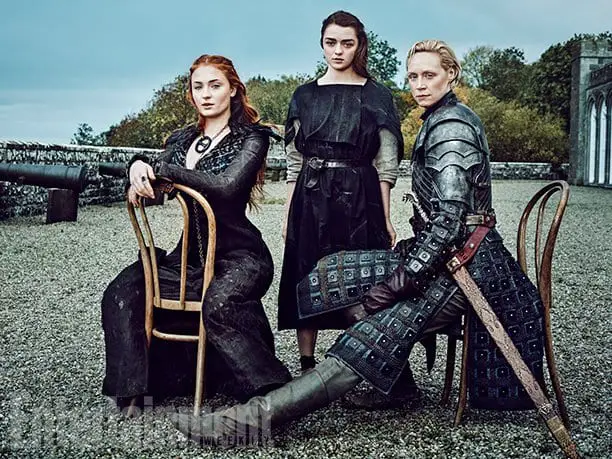
The fact is, despite their insistence otherwise, Thrones falls into the trap that “strong” means masculine, and masculine means violent. Any and all other women aren’t valid. Sansa wasn’t valid for them until she became their cardboard cutout of empowerment, backed up when showrunner Dan Weiss proclaimed the Ramsay execution scene his favorite moment of hers to date.
Thrones has a massive place in our culture and it’s influence of other media is undeniable, so in a season that so many claimed was groundbreaking feminism, and the stuff we’ve been “waiting for,” it’s important to recognize that what is actually being celebrated is a misogynistic, damaging, and weak depiction of the diversity of strengths, power, and individuality that exist in women. Yes, sometimes women can be violent. Some women can be psychically strong and some women can be weak. Some women’s strength lies within their emotions. Emotions are valid and the fervor with which the show pushes back against that ideology, an ideology that is usually coded as feminine, the more they reveal the lack of complexity or understanding behind their use of the word “empowerment”.
The scene that most highlights this problem is the scene with Sansa, when she sets Ramsay’s starving hounds onto his tied up, bleeding body to devour him to death. As the hounds start tearing at his throat, she walks away, smiling to herself. It’s a moment that got many cheers, but instead of viewing the moment through the lens of tragedy that this girl has become so numb and immune to violence, that her experiences have turned her into this person who takes joy in hearing a man, however despicable of a man, be torn apart, the show celebrated it and pronounced it empowering and exciting. It pushes Sansa down a “badass” (dangerous) path to joining the violence crazed empowered women of Thrones.
This is so far away from who Sansa’s character is, which is tragic, yet we’re supposed to feel good about that moment. A lot of the cheers from the show-watcher community came from the fact that Sansa, a girl whom they previously thought to to be “weak”,”catty,” and “annoying,” became the person they thought she “should” be. This is the version of “strong” that the show projects and it does have severely worrying implications.
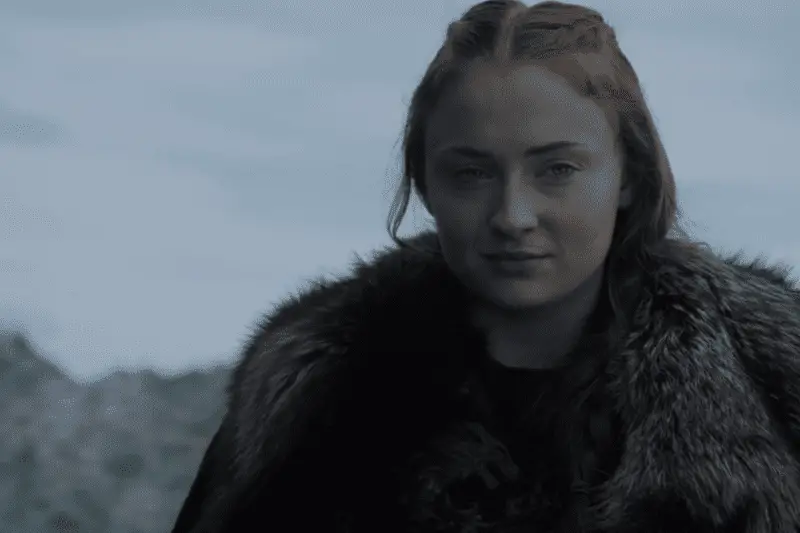
Despite this being fiction, fiction influences reality and this is a show with a wide reach and creators that consistently tout the story as truthful and shocking “realism”.
The issue is all in the lens through which we see the story. We talk her a lot about depiction versus endorsement. You can show horrible things, reflect the true horrors of this world (to not do so would erase them), but you have to condemn them in the narrative.
With Ramsay’s death, the showrunners’ and writers’ interpretation of this scene was that it was a positive, which is the problem. But the biggest issue with this scene itself is that it hardly stands alone.
We’ve seen time and time again our female characters succumbing to violence and being rewarded and cheered in the narrative for it, even more than was already listed. Dany burned the Khals alive this season, along with the sacred Dothraki temple (same “empowered murderous smirk of feminism” and all), single-handedly dismantling Dothraki culture and their way of life, yet it was written that she would benefit from this. The moment of her destroying a part of who these people are, and what they’ve come to know, was a moment that we were meant to find ‘badass’ and ‘empowering’. I, and many others, didn’t find a white woman destroying a brown peoples temple and culture in one swift move, a people whom are known to be skeptical of witchcraft and magic, and then have said brown people bow to her, unquestioning and devoted, empowering. It was disturbing.
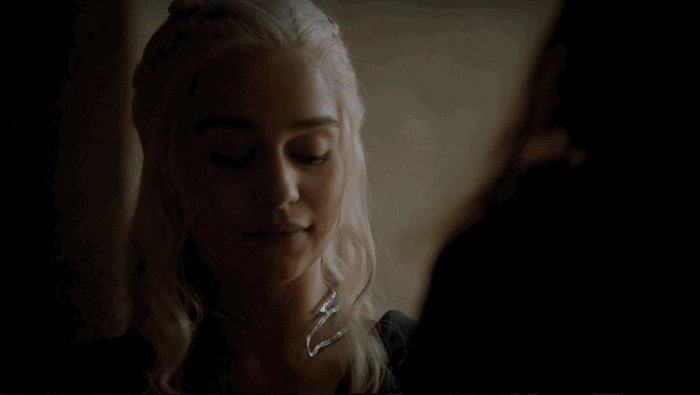
Again, they continually only write one kind of woman on top. In Meereen it’s Dany burning and killing with a deadpan expression or a smirk. In Dorne it was Ellaria and the Sand Snakes brutally killing their own relatives and people, including their innocent cousin and much loved prince because “weak men will never rule Dorne again.”
Benioff and Weiss manage to represent first grade white feminism to a T. God forbid a woman actually navigate powerfully within this patriarchal world.
It’s the same with Arya. We no longer see the tragedy of a young girl being forced to kill. It’s not badass. It’s not cool. It’s horrifying that she was put in this position in the first place. She’s a child. However, it’s what they think is the ideal. They think feminism means every woman has to wield a sword or revel in violence. It’s why Brienne’s first instinct now is to grab for her sword.
Hopefully this isn’t controversial, but violence is not cool. Violence is not an answer. Violence is futile and I genuinely believe the show used to attempt to convey that. Not anymore. They are literally the people who think that when we are all crying for strong female characters, we mean literal strength as opposed to complexity, diversity, and nuance. The thematic elements of the futility of war, revenge, and violence that run throughout Martin’s novels have become lost on the show.
Up until now in the narrative, Sansa was not treated with the same care, consideration, and love that Arya’s character was accorded in both the writers’ room and the fandom. The large perception was that Sansa was not ‘cool’. She was not psychically powerful. It’s why she’s often compared Arya. Benioff and Weiss seem to see Arya as the good, the ideal.
Granted, most of that is also because they don’t really understand Arya. Or at least they don’t understand the Arya of the books. Her show character is actually incredibly misogynistic, but to them that’s why she’s so great. She defeats gender norms and dislikes the idea of femininity. That’s not the case with Martin’s Arya. The show doesn’t understand that women are not all physically strong or even intellectually superheroes. In reality, that diversity is great. That’s what we are all craving for. Women can be physically strong, they can be mentally strong and they can be emotionally strong. Women can be weak, they can be cruel, they can be incredibly kind. That’s dimensionality. That’s what makes us diverse and different and individual.

In the audio commentary of “Unbowed, Unbent, Unbroken,” in Season 5, Bryan Cogman, when discussing the controversial rape scene, talks about this notion of comparing Sansa to Arya and makes it sound like what we want is for everyone to be the “ideal” and that his ideal is violence and masculinity. He says “we can’t all be like Arya.”
Softness, femininity and internalization is not the ideal. It’s the other and is dismissed. It’s just so painfully obvious that they are the people who think exploding things and senseless violence is cool. They’re the people who cheer as superheroes fight all while destroying a city, not thinking about the people in the actual city who are affected by this violence and destruction. I still think Sansa’s scene was character assassination no matter how you look at it, but it’s the greater pattern and the greater message they are sending that is the larger issue.
In the end, would I have preferred her to execute Ramsay in the northern fashion with his head on a block and a sword at the ready? Yes, I think it’s an important through-line for the Stark children, especially Sansa, considering how often people disassociate her with her fellow siblings and often paint her as the other. I think seeing that, or seeing the unraveling of that honor methodology in the Starks as a negative, would have been more effective. “The man who passes the sentence should swing the sword.” That is the quote. They even used it in the show! Ramsay most definitely should have been killed, and too right should that decision come from Sansa.
However, since when is gratuitous violence honorable? Honor isn’t all that matters, but the North, more more specifically the Starks, are all about honor. They were raised on it. This was not in line with that sense of justice, yet already there are countless gifsets highlighting all the Stark children dealing out northern justice and adding this event as apart of that. If Sansa called for someone to bring a block to have Jon chop of his head, all the while passing his sentence and declaring his death, that would have been a parallel. This isn’t a parallel to really anything, except Ramsay’s own methods.
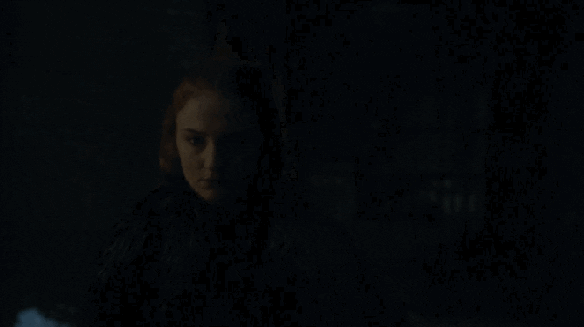
I’m not saying she’s “as bad” as him. Ramsay’s despicable and she’s been a victim of his violence and abuse. However, how are we supposed to feel good that she would have become someone who seeks justice in pure savagery? She smiles. And it’s when the smile occurs. It’s not later when she takes a breath and realizes she doesn’t have to look behind her back every second of her life in fear. It’s when she’s listening to dogs ripping apart someone’s face. She’s taking pleasure in the violence and the act, not just the death. To deny it is to deny what the showrunners’, actors’, and director’s intentions were.
Sophie Turner, the actress who plays Sansa Stark, gave an interview after with EW, in which she said “It’s so great to be able to have my first kill.” It’s so haphazard, as if now she’s finally become the “badass” she should be. This scene and this numbness to violence is in no way painted as a negative. If that was the case, it would be another way in which the scene would work. Implication and framing is everything. People can be violent, and they can develop into violent and crueler people, yet we have to see the tragedy in that, not the reward. You can read all you like into a moment but if it’s not actually framed and executed in a certain way, it makes it clear that that isn’t the story the writers are trying to tell.
Sansa isn’t the only character who is supposed to tell the tale of the futility of violence. It’s a theme in the books. It’s supposed to be apparent in every storyline and in every character, whether they are violent or not. It’s the framing of said violence and the outcome of said violence that matters. Ellaria Sand’s quote from A Dance With Dragons is ever so relevant.
“I saw your father die. Here is his killer. Can I take a skull to bed with me, to give me comfort in the night? Will it make me laugh, write me songs, care for me when I am old and sick?”
Violence doesn’t change what happened. It can’t. It’s one of the most prominent messages present in Martin’s work and it can’t be dismissed or ignored. It’s basically what the entire series is built upon. Sansa isn’t here to teach us that lesson, but the show and story are as a whole. The context does matter and in this context, she’s seeking vengeance not justice. Justice is reading him his rights and then swinging the sword that would behead him. Vengeance is seeking something in return for what was done to you and on that same level. This was emotion-led (as is understandable), but that’s not justice. Justice is led by the law. Vengeance is led by emotion. Vengeance is to be vindictive where as justice is to be vindicated. This act wasn’t just about killing Ramsay. If that was the case, she could have just had Jon chop off his head. This was about retaliating.
Then there’s the fact that this just isn’t in character for Sansa Stark, who has an arc that is important to tell in the books. The Sansa Stark who is learning the game of thrones, whose empowerment comes from her empathy, which is just as valid and just as strong, wouldn’t take pleasure in this. In A Clash of Kings Sandor says,“Don’t tell me Lord Eddard Stark of Winterfell never killed a man.”
“That was his duty. He never liked it,” Sansa replies.
Yet, the showrunners and the actress and actor all saw this moment as Sansa taking pleasure in her vengeance.
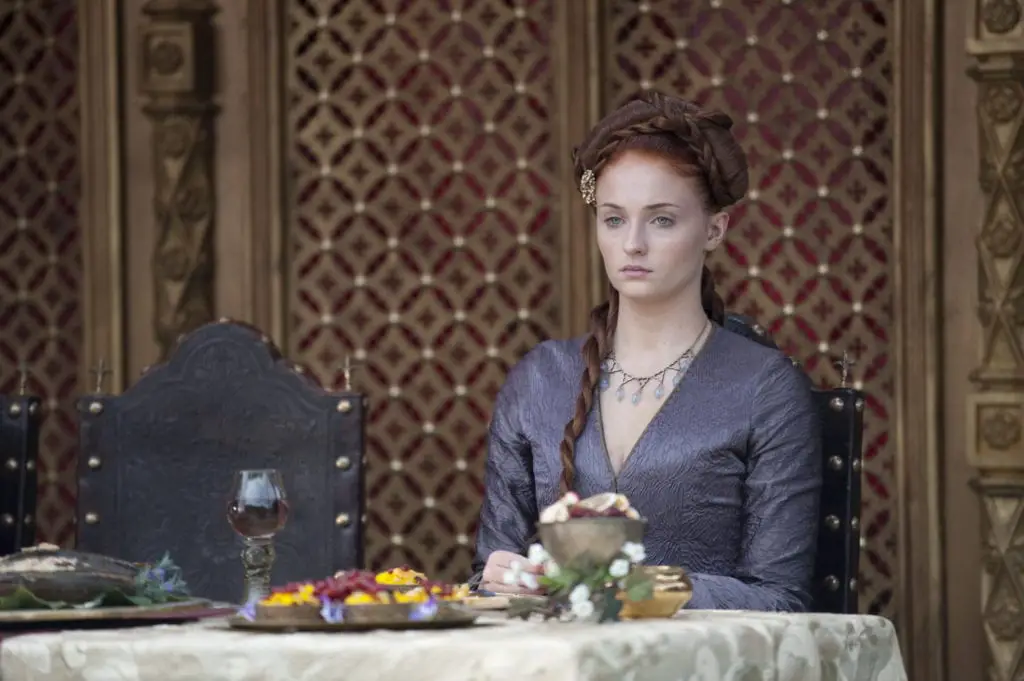
This is the same girl that was still able to be horrified at the sight of Joffrey’s death while still wishing for it! Joffrey who had abused her and had his kingsguard hit her bloody whenever he was displeased, who wished to present her her brother’s head, who was responsible for killing her father, yet the humanity in her still can’t get the gruesomeness of his death out of her head, as exemplified by her chapter after the Purple Wedding;
He had not been dead when she left the throne room. He had been on his knees, though, clawing at his throat, tearing at his own skin as he fought to breathe. The sight of it had been too terrible to watch, and she had turned and fled, sobbing. Lady Tanda had been fleeing as well.
“You have a good heart, my lady,” she said to Sansa. “Not every maid would weep so for a man who set her aside and wed her to a dwarf.” A good heart. I have a good heart. Hysterical laughter rose up her gullet, but Sansa choked it back down.
She couldn’t revel in his death. It was “too terrible to watch”, despite the fact that she wanted it. Her hysterics rise up because her emotions are so heightened and seeing someone die right in front of you, in such a gruesome way, despite it being a person who hurt you consistently and took everything you love from you, is upsetting.
The bells were ringing, slow and mournful. Ringing, ringing, ringing. They had rung for King Robert the same way. Joffrey was dead, he was dead, he was dead, dead, dead. Why was she crying, when she wanted to dance? Were they tears of joy?
She questions if her tears are tears of happiness because she honestly doesn’t know. It’s a good example of how well Martin writes aftermath, which this show consistently fails to do. Instead of what was basically a rape revenge fantasy portrayed on our screen, in the novels we have someone who has been abused and their abuser had just perished right before their eyes…yet she’s crying. She’s happy he can’t hurt her anymore, but it doesn’t erase the fact that watching someone’s life be sucked out of them, breath by breath as Joffrey’s had is terrifying to witness. It further illuminates and supports the theme in Martin’s writing of the futility of violence and war. It doesn’t change anything that happened in the past. It doesn’t fix it. That’s not to say that a different survivor wouldn’t take more joy in it, but that’s not Sansa and it’s not what her personal arc means for the overall thematic journey.
In her next chapter, she recalls a dream she had:
She dreamt of Joffrey dying, but as he clawed at his throat and the blood ran down across his fingers she saw with horror that it was her brother Robb.
The fact that in her dream in the book, she parallels Joffrey’s death with the death of a brother she loved just goes to show that despite her happiness to get away from him and despite the fact that she is relieved he can never hurt her again, his death is still tragic. He was a child, clawing at his throat, unable to breath, slowly dying in front of her, and it’s sad. She feels it’s just that he died, but cannot force herself to take joy in the circumstance and imagery of his death. She’s happy to get away, she’s happy to not have to be at his mercy every again, but it haunts her. However, according to the show, isn’t it empowering and cool to have Sansa employ the same methods of torturous and gruesome violence that she and many others suffered at the hands of her abuser?
If I am ever queen I will make them love me.
That is who she is. She’s not a beacon of virtue. No one is saying that. That would imply that she’s a one dimensional character and not a human being with flaws and strengths. However, we’re supposed to see her as better. She’s empathetic. It’s who she is and it’s what makes the difference between our heroes and our villains despite the multiple POV’s in the books. Martin has stated before that Tyrion is a villain, yet he’s complex and multi-dimensional so we feel for him. It’s clear, however, that the Jon of the show is not. If it came time for battle between the Starks and the Lannisters, we’d feel conflicting emotions, because Martin gives such dimensionality to his characters, they are all quite morally grey and we understand them all, however, I think it’s safe to say we would want to root for the Starks.
We want the Starks to come out on top and it’s why they most likely will in some form, because they are our heroes, in the most basic sense of the word. They are our protagonists in a world that doesn’t necessarily have the idealized version of heroes and villains, but has people whom we believe in. It’s why this episode was supposed to be a big victory we’ve been waiting for. To see our “hero”, someone whom was defined by their empathy and compassion, take pleasure in torturous killing makes everything come into question. If we were supposed to be disturbed by this, then I would say this scene was successful and that’s a perfectly valid outcome of all she’s been through. Judging by what has come out of the creators and actors, that is not what we are meant to feel.

A lack of empathy and compassion isn’t something I find empowering. She could be unsettled by the act and her walk away could even convey that. If she didn’t smile. If she walked away, disturbed, not wanting to watch it and then, maybe she smiled later, somewhere else, when she can take a moment to see that she’s actually safe and she’s home. In that context, in that framing, then I think the scene itself could have even worked. Or even if it wasn’t a smile, but a sigh of relief when she’s walking the halls of Winterfell again. She’s relieved that Ramsay can never harm her again, but what he did to her still happened. It’s more complex and more powerful to see her struggle with the violence of it, feeling worse but better for it. She was happy to no longer suffer at the hands of Joffrey but disturbed by the violence of his death. It’s her first kill, as Sophie Turner puts it, and that changes someone.
The show runners literally stated that Sansa walking off and smiling (from watching a person get eaten alive by dogs) was one of their favorite moments they’ve ever filmed, which only further highlights their refusal to understand Martin’s constant theme of the futility of war and violence, as well as his subversion of the fantasy tropes of revenge and death. The fact that they think her moment of reckoning where “This isn’t the little girl who wanted to dress up like a princess anymore,” is empowering furthers their unwillingness to recognize the power in different kinds of female strength. Sansa’s strength has always been her empathy and she used it to get by and manipulate the situations around her. However, just as is always the case; murder, torture, and violence are the only forms of empowerment they seem to champion as we’ve seen it time and time and again be it with Dany, Yara, Cersei, Arya, or now with Sansa.
In reality, this show is not good at writing aftermath, it’s not good at writing repercussions and it’s not good at dealing with abuse. It’s the same show that had Yara’s put up or shut up method of “therapy” (that’s the word they used) work. Yeah they didn’t ignore the fact that Sansa was raped as many feared, which is great, but that should be the bare minimum. They certainly ignored Jaime raping Cersei or even the toxicity of their relationship in general for the past three seasons. Danny has been on the deadpan violence-followed-by-a-smirk path for a few seasons now, Cersei has almost always lived within it, and Season 5 Ellaria has always been that caricature. However, Sansa
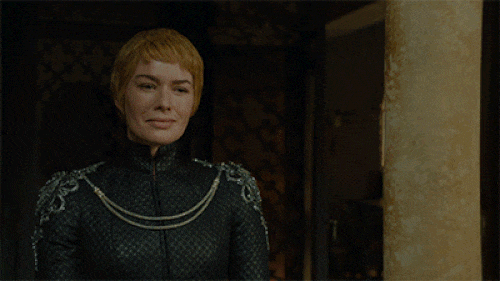
is the newest edition and the one that really shows their hand, giving us a clear peek behind the curtain of what their creative through process is. Their writing of Sansa has been a rollercoaster ride ever since Season 1, however this just piles on to the growing pattern of glorifying violence as empowerment and their refusal to explore the theme that A Song of Ice and Fire is built on. The futility of violence, war, and revenge is what makes the novels so unique in the general fantasy genre and the tropes that plague it, but the show seems determined to dismiss it.
Can’t wait for season 7!

